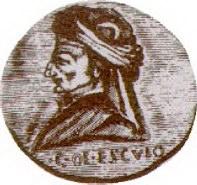
Cecco d'Ascoli (1257 – September 26, 1327) is the popular name of Francesco degli Stabili (sometimes given as Francesco degli Stabili Cichus), an Italian encyclopaedist, physician and poet. Cecco (in Latin, Cichus) is the diminutive of Francesco, Ascoli was the place of his birth. The lunar crater Cichus is named after him.
Life
Born in Ancarano, in the modern Abruzzo region (at the time under the jurisdiction of Ascoli), he devoted himself to the study of mathematics and astrology. In 1322 he was made professor of astrology at the University of Bologna. It is alleged that he entered the service of Pope John XXII at Avignon, and that he cultivated the acquaintance of Dante only to quarrel with the great poet afterwards; but of this there is no evidence.
Having published a commentary on the Sphere of John de Sacrobosco, in which he propounded audacious theories concerning the employment and agency of demons, he got into difficulties with the clerical party, and was condemned in 1324 to certain fasts and prayers, and to the payment of a fine of seventy crowns. To elude this sentence he went to Florence, where he was attached to the household of Carlo di Calabria. His freethinking and plain speaking had made him many enemies; he had attacked the Commedia of Dante, and the Canzone d'amore of Guido Cavalcanti. But according to Ernst Cassirer's The Individual and the Cosmos in Renaissance Philosophy, he died at the stake for his attempt to determine the nativity of Christ by reading his horoscope (page 107). The physician Dino del Garbo was indefatigable in pursuit of him; and the old accusation of impiety being renewed, Cecco was again tried and sentenced for relapse into heresy. He was burned at Florence the day after the sentence, in his seventieth year. He was the first university scholar to be burned by the Inquisition.
Works
Cecco d'Ascoli left many works in manuscript, most of which have never been published. The book by which he achieved his renown and which led to his death was the Acerba (from acervus), an encyclopaedic poem, of which in 1546, the date of the last reprint, more than twenty editions had been issued. It is a compendium for the contemporary natural science of the time, including "the order and influences of the heavens, the characteristics and properties of animals and precious stones, the causes of phenomena such as meteors and earthquakes—and of commonplace moral philosophy".[1]
Bibliography
 This article incorporates text from a publication now in the public domain: Chisholm, Hugh, ed. (1911). "Cecco d'Ascoli". Encyclopædia Britannica (11th ed.). Cambridge University Press.
This article incorporates text from a publication now in the public domain: Chisholm, Hugh, ed. (1911). "Cecco d'Ascoli". Encyclopædia Britannica (11th ed.). Cambridge University Press.- Marco Albertazzi, ed. (2005). Acerba etas. Trento: La Finestra editrice.
- Marco Albertazzi, ed. (2002). Studi stabiliani. Trento: La Finestra editrice.
- Thorndike, Lynn (1934). History of Magic and Experimental Science, vol. 2. New York: MacMillan. pp. 953–4, 959.

_-_2374087_ic00362000_Scan00008.jpg)